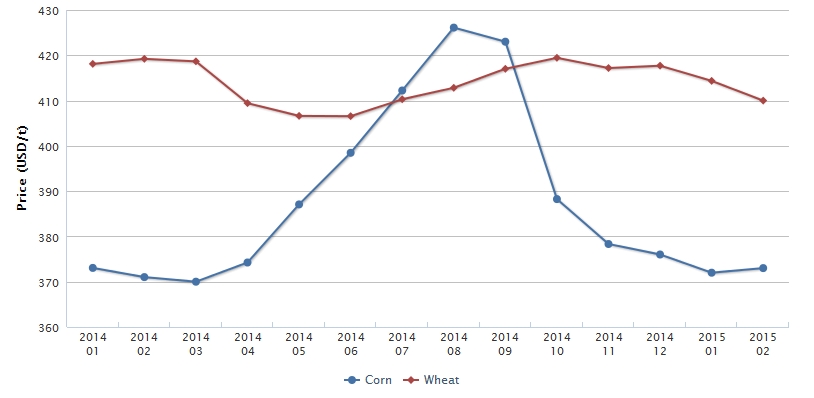Affected by the ongoing state
storage and purchase tightening the corn supply in the market, it is expected
that the corn starch price will climb up stably in China.
China’s corn starch price expected to rise
steadily in short term

Summary: Affected by the ongoing state
storage and purchase tightening the corn supply in the market, it is expected
that the corn starch price will climb up stably in China.
Due to the ongoing state storage and
purchase of corn, the market supply of corn is reducing. According to the
information released by the State Administration of Grain, as of 5 March, 2015,
there were total 110.41 million tonnes of new-harvested corns purchased by the
grain enterprises in 11 main corn producing areas in Hebei Province and
Heilongjiang Province, increasing by 6.48 million tonnes compared to the same
period last year. Along with processing enterprises restarting their
productions, corn spots are reducing and the producers’ inventories are also
declining. At present, due to the tight supply of corn spots coupled with the
increasing volume of state storage, enterprises need to raise the purchase
price of corns to maintain the raw material supply for production.
Regarding the whole industry, China’s
starch enterprises have suffered from losses for three consecutive years and
they are out of funds. Therefore, the enterprises with a large number of stocks
are relatively few and the stocking level remains low. Besides, after the
Chinese Spring Festival, starch enterprises recover production slowly and some
of them suspend production for a longer period than previous years, thus resulting
in the tight supply of corn starch in the market. Since 2015, China’s corn
starch price has kept rising steadily, from USD469/t to USD471/t. Under the
unsatisfied economic environment in 2014, the corn starch demand also remained
weak, which led to declining purchases and inventories of corn starch
processing enterprises. It is predicted that enterprises will start purchasing
corns since March 2015.

In view of the whole corn starch market in
March, the operating rate of domestic corn starch industry is gradually
increased to over 50% (45% in Feb.). Since there are still some enterprises
undergoing production suspension for overhaul, as time goes on, the operating
rate will further increase and the corn starch supply will be gradually
improved.
After entering into March, the prices of
corns in the ports of South and North China increase. The reasons are:
1. The ongoing state storage and purchase
of corns reduces the spot corns in the market;
2. Feed factories in South China strengthen
efforts to purchase corns in order to reduce the influence of the fluctuant
corn prices.
Additionally, in recent two months, the
snowy weather in Northeast China hinders the corn transportation, thus reducing
the supply of corn spots to some extent.
So far, the demands from the downstream
sectors of corn starch industry remain weak. For instance, the downstream
starch sugar, papermaking, food and fermentation enterprises do not restart
operations mostly, which causes unsatisfied transaction volume overall. These
downstream enterprises still consume the previous stocks currently and fewer
purchase raw materials (corn). It is worth noting that, wheat, as the
substitute of corn, occupied a large feed processing market instead of corn
based on its low price in 2014 (part of wheat producing areas suffered from
continuous rainy weather in 2014, resulting in serious germination). Moreover,
wheat is widely used in feed and alcohol production to replace corn, which to
some extent reduces the market demand for corn.
Although substitute enters into market by
dint of cost advantage, it makes little impact on the corn market since the
demands from downstream feed and alcohol sectors are relatively weak. In
addition, because the state storage and purchase of corn will last to April, so
the corn spots will continue to reduce. The stocking demand of processing
enterprises and the reducing corn spots create the conflicts. Therefore, CCM
predicts that the corn starch price will continue to rise in the future.
Due to the ongoing state storage and
purchase of corn, the market supply of corn is reducing. According to the
information released by the State Administration of Grain, as of 5 March, 2015,
there were total 110.41 million tonnes of new-harvested corns purchased by the
grain enterprises in 11 main corn producing areas in Hebei Province and
Heilongjiang Province, increasing by 6.48 million tonnes compared to the same
period last year. Along with processing enterprises restarting their
productions, corn spots are reducing and the producers’ inventories are also
declining. At present, due to the tight supply of corn spots coupled with the
increasing volume of state storage, enterprises need to raise the purchase
price of corns to maintain the raw material supply for production.
Regarding the whole industry, China’s
starch enterprises have suffered from losses for three consecutive years and
they are out of funds. Therefore, the enterprises with a large number of stocks
are relatively few and the stocking level remains low. Besides, after the
Chinese Spring Festival, starch enterprises recover production slowly and some
of them suspend production for a longer period than previous years, thus resulting
in the tight supply of corn starch in the market. Since 2015, China’s corn
starch price has kept rising steadily, from USD469/t to USD471/t. Under the
unsatisfied economic environment in 2014, the corn starch demand also remained
weak, which led to declining purchases and inventories of corn starch
processing enterprises. It is predicted that enterprises will start purchasing
corns since March 2015.
In view of the whole corn starch market in
March, the operating rate of domestic corn starch industry is gradually
increased to over 50% (45% in Feb.). Since there are still some enterprises
undergoing production suspension for overhaul, as time goes on, the operating
rate will further increase and the corn starch supply will be gradually
improved.
After entering into March, the prices of
corns in the ports of South and North China increase. The reasons are:
1. The ongoing state storage and purchase
of corns reduces the spot corns in the market;
2. Feed factories in South China strengthen
efforts to purchase corns in order to reduce the influence of the fluctuant
corn prices.
Additionally, in recent two months, the
snowy weather in Northeast China hinders the corn transportation, thus reducing
the supply of corn spots to some extent.
So far, the demands from the downstream
sectors of corn starch industry remain weak. For instance, the downstream
starch sugar, papermaking, food and fermentation enterprises do not restart
operations mostly, which causes unsatisfied transaction volume overall. These
downstream enterprises still consume the previous stocks currently and fewer
purchase raw materials (corn). It is worth noting that, wheat, as the
substitute of corn, occupied a large feed processing market instead of corn
based on its low price in 2014 (part of wheat producing areas suffered from
continuous rainy weather in 2014, resulting in serious germination). Moreover,
wheat is widely used in feed and alcohol production to replace corn, which to
some extent reduces the market demand for corn.
Although substitute enters into market by
dint of cost advantage, it makes little impact on the corn market since the
demands from downstream feed and alcohol sectors are relatively weak. In
addition, because the state storage and purchase of corn will last to April, so
the corn spots will continue to reduce. The stocking demand of processing
enterprises and the reducing corn spots create the conflicts. Therefore, CCM
predicts that the corn starch price will continue to rise in the future.

About CCM:
CCM is the leading market intelligence
provider for China’s agriculture, chemicals, food & ingredients and life
science markets. Founded in 2001, CCM offers a range of data and content
solutions, from price and trade data to industry newsletters and customized
market research reports. Our clients include Monsanto, DuPont, Shell, Bayer,
and Syngenta. CCM is a brand of Kcomber Inc.
For more information about CCM, please
visit www.cnchemicals.com or get in
touch with us directly by emailing econtact@cnchemicals.com or calling +86-20-37616606.